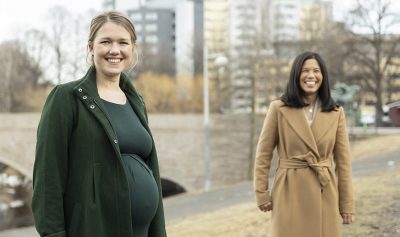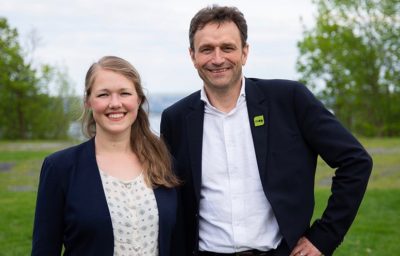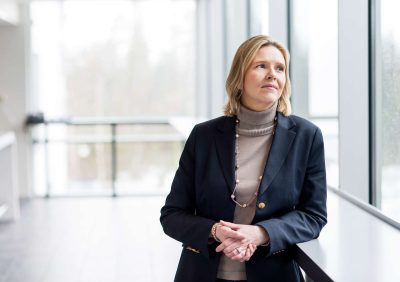Une Bastholm’s recent and sudden resignation as leader of Norway’s Greens Party (MDG) didn’t only surprise colleagues and spark debate over the party’s policy. It also set off debate over why it’s still so much more difficult for a woman to combine career and family than it is for a man.

“I was pulled in too many directions,” Bastholm said in explaining why she was stepping down as party leader, just months after being re-elected to a second term.
“Being a party leader isn’t just a full-time job,” she said afterwards to newspaper Klassekampen. “It’s also a lifestyle. It functioned quite well for a long time, but it became a bit much. I’ve been in the party’s leadership for six years. During that time I’ve had (two) children, and I eventually missed having more time with my girls.”
The 36-year-old Bastholm has also said that she felt like she didn’t have the time or the energy that’s needed to be both leader of a political party and the mother of small children. She’ll continue as a Member of Parliament for MDG, but simply wants more time with her family and her young children before they start school.
Bastholm thus became the third top politician from MDG (Miljøpartiet de grønne) to resign from party leadership positions in order to have more time with their small children: Lan Marie Berg has also continued as a Member of Parliament for MDG but stepped down from party leadership, while Hanna Marcussen, one of the Greens’ top leaders in the Oslo city government, is leaving politics entirely.
“Combining life with small children with top politics demands setting extremely hard priorities,” Berg told newspaper Dagsavisen, “and to stand on the front line for a radical and environmentally oriented party that’s growing quickly is extra tough. Une has done that for several years and it’s clear that has demanded a lot of her. I have great respect for the decision she has made.”
Marcussen agreed: “I have a lot of respect for women who manage to be in top politics while also being a parent of small children, but I felt myself that I didn’t do well enough for both sides. I also wanted more time and energy for my son.”

All acknowledge that it’s still mostly women who step aside because of their children and family, hardly ever men. “In principle I don’t think there should be a difference there,” Marcussen said, “but it can be that women live with certain expectations that they perhaps have created themselves, that they must deliver both as a mother and top politician. Then it’s difficult when you feel that you don’t deliver.”
She doesn’t think MDG itself makes it more difficult than other parties, where women from Labour’s Gro Harlem Brundtland to the Progress Party’s Sylvi Listhaug hung on to political power despite having children at home. Rather, Marcussen said, MDG simply has more young politicians who have taken on leadership roles at an age when having children is more common.
Bastholm herself stressed that she always received help and support both from her party and her family, but that she just never felt she had enough time. She also had the same lengthy paid maternity leave of around a full year that’s available to all mothers in Norway. The problem is that as in most parties, there are many evening meetings, and that’s difficult to combine with family needs when the only time of the day she could have with her children was after they left day care and before they’d need to go to bed.
Bastholm got lots of sympathy across party lines, including Listhaug of the conservative Progress Party that otherwise opposes MDG on most all issues. “I can well understand Bastholm’s position on this, especially when the children are very young and it’s extremely demanding to get the day to function for the family,” Listhaug told Dagsavisen. Listhaug’s children are now aged five, 11 and 14 and while not party leader when her youngest was born, she was a government minister and deputy leader.
“I think all families feel the same, and it’s extra demanding when you’re party leader or a minister,” Listhaug said. “I have great respect for her (Bastholm’s) decision, but think it’s sad because she’s a good politician.” Listhaug added that she wouldn’t have been able to combine her own roles if her children didn’t understand her role as a politician and if she hadn’t had her husband’s “fantastic contributions on the home front.

Others, including Kari Elisabeth Kaski of the Socialist Left Party (SV) also call Bastholm’s decision “sad” because they think top politicians should come from all phases of life in order to best represent the public. “It’s important for our democracy,” Kaski told Dagsavisen. “We must have folks in various life situations and with various abilities to function. I think many understand the squeeze Bastholm was in, when having to combine full job, children and political duties.”
Anette Trettebergstuen, currently a government minister for the Labour Party, agreed. “Yes, it’s an advantage (when children grow up) but do we really want that to be? Politics, from the grass roots level to the top, must have a place for everyone. Une’s departure is sad, because she’s a very good politician and sad because she didn’t think the system worked.”
Guri Melbye, leader of the Liberal Party, echoed such remarks, noting that as the mother of small children herself, she knows “how demanding it is to combine small children’s lives with top politics.” She said she’s “very lucky” that she has “clever folks around me” who can step in “so that I can be a mama too.”
Now the leadership of the Greens appears up for grabs, and questions are rising over whether it will become less radical to win more public acceptance. Deputy leader Arild Hermstad took over for Bastholm immediately and even half-joked that he “had an advantage” because his own children have grown up and moved out. Now he faces challenges from others, though, several of them women, who hope to win party members’ favour at an extraordinary national meeting within the next three months.
“Nothing is certain here,” said party member Sigrid Z Heiberg even before other candidates began throwing their hats into the ring. While former party spokesman/leader Rasmus Hansson said he supports Hermstad, Heiberg is evaluating her own chances, as is Natalia Golis of Vestland, the party’s other deputy leader Ingrid Liland, and others.
“We must concentrate on the most important issue, which is the climate- and environment crisis,” Heiberg told news bureau NTB. “We can’t let ourselves be distracted by all the other parties that try to downplay the problems of over-consumption and economic policies that are a catastrophe for our planet.” Even though climate issues were very much a part of last year’s election campaign, MDG fared much more poorly than expected and was later evaluated as having been too radical and unwilling to compromise.
“I’m not afraid of being radical,” Heiberg said, claiming that most Norwegians want climate issues to be addressed “and need a party that’s clear on that.”
newsinenglish.no/Nina Berglund

